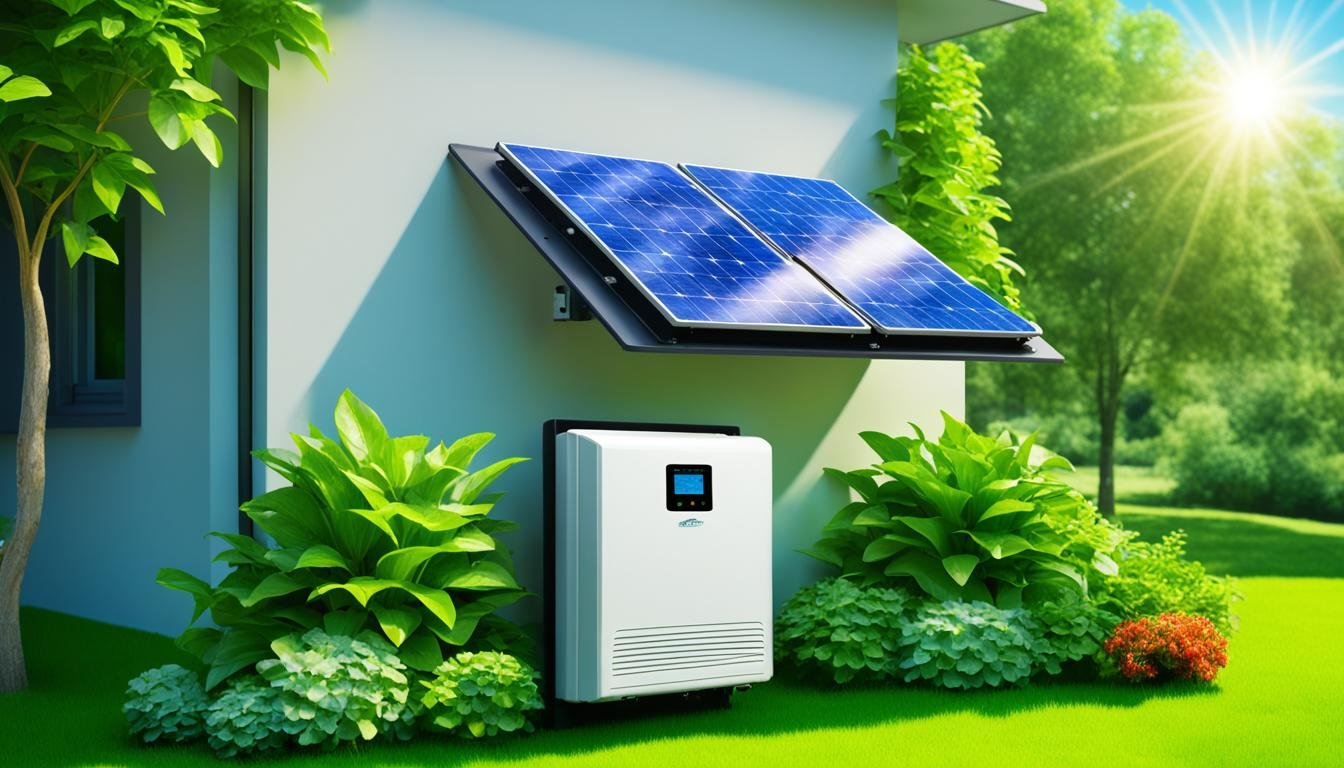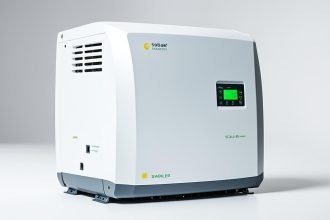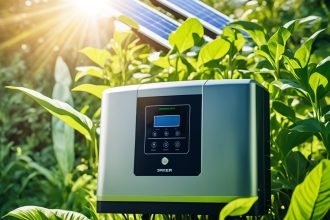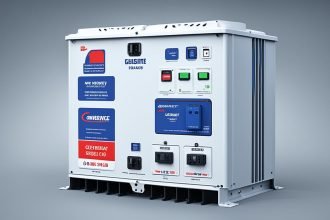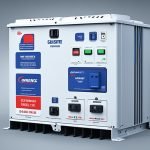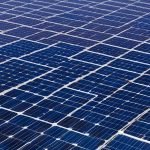As the world increasingly turns to renewable energy sources, solar power has emerged as a leading contender. Harnessing the abundant energy from the sun, solar panels have become a popular choice for homeowners looking to embrace sustainable living. However, to truly unlock the potential of solar energy, a crucial component is required – the solar inverter.
A solar inverter is an indispensable device in the realm of green energy homes. It plays a vital role in converting the direct current (DC) generated by solar panels into alternating current (AC) that can power our homes and appliances. Put simply, without a solar inverter, the energy harnessed from the sun would remain inaccessible and unable to be utilized effectively.
Green energy homes rely on solar inverters to bridge the gap between renewable energy production and everyday consumption. By transforming the DC electricity into AC electricity, solar inverters enable homeowners to power their homes with clean, sustainable energy. These devices contribute to reducing reliance on the traditional power grid, saving both money and the environment in the process.
But what exactly is the role of a solar inverter in a home energy system? How do they ensure safety, efficiency, and optimal energy production? To answer these questions and more, let’s delve deeper into the significance of solar inverters for green energy homes.
Key Takeaways:
- A solar inverter is a crucial component for green energy homes, converting DC generated by solar panels into usable AC.
- Without a solar inverter, the energy harnessed from the sun would be inaccessible and unusable.
- Solar inverters bridge the gap between renewable energy production and everyday consumption, reducing reliance on the power grid.
- They ensure safety, efficiency, and optimal energy production in home energy systems.
- By embracing solar inverters, homeowners can contribute to a more sustainable future while enjoying the benefits of solar power.
Introduction to Solar Inverters and Their Significance
Solar inverters play a pivotal role in the generation of clean energy for green energy homes. They are essential devices that convert the direct current (DC) produced by solar panels into alternating current (AC), which can power household appliances. The significance of solar inverters lies in their ability to ensure efficient energy conversion, monitor energy production, and prioritize safety.
By converting DC to AC, solar inverters enable solar power to be effectively utilized in homes. Without solar inverters, the DC electricity generated by solar panels would be incompatible with household appliances that operate on AC power. Therefore, solar inverters bridge the gap between solar energy production and consumption.
Image: Solar inverter – Significance in Green Energy Homes
Solar inverters not only convert electricity but also perform an important monitoring function. They constantly track the energy production of solar panels, providing valuable data on the amount of energy generated and consumed. This information helps homeowners optimize energy usage, identify any issues or inefficiencies, and make informed decisions about their energy consumption patterns.
Furthermore, solar inverters prioritize safety and efficiency in energy conversion. They incorporate advanced features that protect the system from overvoltage, overcurrent, and other electrical abnormalities. This ensures the longevity and reliability of the entire solar power system, safeguarding both the household and the environment.
In summary, solar inverters are of utmost importance in green energy homes. Their ability to convert DC to AC, monitor energy production, and ensure safety and efficiency makes them indispensable in harnessing the full potential of solar energy. By incorporating solar inverters into residential solar panel systems, homeowners can take a significant step towards achieving energy independence and contributing to a sustainable future.
Understanding the Role of a Solar Inverter in a Home Energy System
A solar inverter plays a crucial role in a home energy system, enabling the conversion of direct current (DC) generated by solar panels into alternating current (AC) that can power household appliances. This section will delve deeper into the various aspects of a solar inverter’s role, including the conversion process, monitoring and optimization of energy production, and ensuring safety and efficiency.
Converting Direct Current to Alternating Current
One of the primary functions of a solar inverter is to convert the DC electricity generated by solar panels into AC electricity usable in homes. By utilizing sophisticated electronics, the solar inverter transforms the DC power into a clean and stable AC waveform that matches the utility grid’s voltage and frequency. This conversion is crucial for effectively utilizing solar energy within a home energy system.
Monitoring and Optimising Energy Production
A solar inverter also plays a vital role in monitoring and optimizing energy production within a home energy system. It constantly tracks the performance of the solar panel system, measuring parameters such as voltage, current, and power output. This data allows homeowners to gain insight into their energy production and identify any potential issues or improvements. With advanced monitoring capabilities, solar inverters can optimize the energy production of the solar panel system, ensuring maximum efficiency and output.
Ensuring Safety and Efficiency in Energy Conversion
Ensuring safety and efficiency in energy conversion is another critical role of a solar inverter. Modern solar inverters come equipped with advanced safety features, such as anti-islanding protection, which prevents backflow of electricity to the grid during power outages. Additionally, solar inverters incorporate efficient power electronics and algorithms to minimize energy losses during the conversion process. This increases the overall efficiency of the system, maximizing the utilization of solar energy and reducing reliance on the grid.
Understanding the role of a solar inverter in a home energy system is essential for harnessing the full potential of solar energy. From converting DC to AC, monitoring and optimizing energy production, to ensuring safety and efficiency, solar inverters are pivotal in enabling the use of solar power in homes. The next section will discuss the necessity of a solar inverter for residential solar arrays, further highlighting their significance in sustainable energy solutions.
The Necessity of a Solar Inverter for Residential Solar Arrays
Residential solar arrays have become increasingly popular as homeowners seek to harness clean and renewable energy for their homes. However, solar panel arrays alone are not sufficient to power households. This is where the necessity of a solar inverter comes into play.
A solar inverter is a vital component in a residential solar system as it converts the direct current (DC) electricity generated by solar panels into alternating current (AC) electricity that can be used by household appliances. Without a solar inverter, the DC electricity produced by the solar panels would be incompatible with the AC appliances found in most homes. Thus, a solar inverter acts as an intermediary, ensuring that the electricity generated from solar panels is usable for residential purposes.
By converting DC to AC, a solar inverter makes solar energy practical and usable in residential settings. It enables homeowners to power their lights, appliances, and electronics with the electricity generated from their solar panel arrays. This not only reduces reliance on the grid but also contributes to a more sustainable and eco-friendly lifestyle.
Additionally, a solar inverter plays a crucial role in optimizing energy production. It continuously monitors the solar panel arrays, tracking the amount of energy being generated and adjusting the conversion process accordingly. This ensures that the solar panels are operating at their maximum efficiency, maximizing the output of usable electricity.
Moreover, a solar inverter provides safety measures to protect both the solar system and the household. It includes features such as anti-islanding protection, which disconnects the solar system from the grid during power outages to prevent backfeeding and protect line workers. The inverter also monitors voltage levels, preventing overvoltage and reducing the risk of electrical damage.
In conclusion, the necessity of a solar inverter for residential solar arrays cannot be overstated. It converts the DC electricity generated by solar panels into AC electricity, making it compatible with household appliances. Not only does it enable the practical use of solar energy in homes, but it also ensures optimal energy production and provides safety measures. Investing in a high-quality solar inverter is crucial for homeowners looking to maximize the benefits of their residential solar arrays and embrace a greener and more sustainable future.
Different Types of Solar Inverters for Residential Use
Residential solar systems have become increasingly popular as more homeowners embrace renewable energy solutions. A crucial component of any residential solar system is the solar inverter, which converts the direct current (DC) generated by solar panels into usable alternating current (AC) for household appliances and devices. When it comes to residential solar inverters, there are several types available, each with its own unique features and benefits. Understanding these different types can help homeowners make informed decisions when selecting the most suitable solar inverter for their specific needs.
String Inverters: An Old Guard Stepping Up
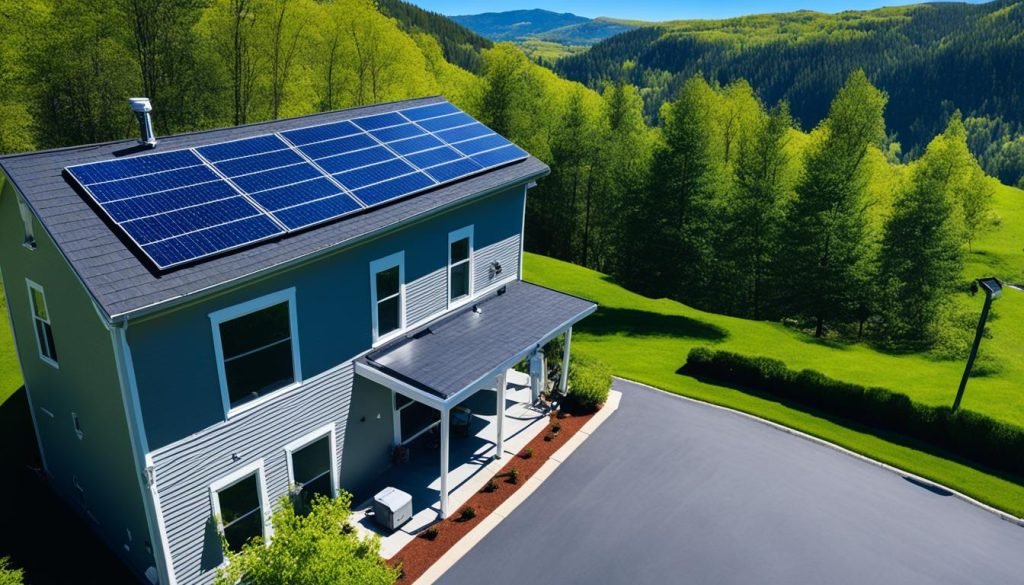
String inverters, also known as central inverters, have been the traditional choice for residential solar installations. These inverters are designed to handle the output of multiple solar panels connected together in strings. They are cost-effective and offer high efficiency. However, string inverters have some limitations. If one panel in the string underperforms, it can affect the performance of the entire string. Additionally, shading or dirt on one panel can decrease the output of the entire string. Despite these limitations, string inverters remain a reliable and widely used option for residential solar arrays.
Central Inverters: The Powerhouses for Larger Systems
For larger residential solar systems or commercial installations, central inverters are often the preferred choice. These inverters, also referred to as large-scale or commercial inverters, are capable of handling the high power output of multiple solar panels. Central inverters offer high efficiency and system-level data monitoring. They are suitable for larger-scale installations where maximizing power output is a priority. However, central inverters may have higher upfront costs and require additional space for installation compared to other types of inverters.
Microinverters: Catering to Individualised Solar Solutions
Microinverters provide a unique solution for residential solar systems by offering individual-level power conversion. Unlike string or central inverters, microinverters are installed on each solar panel, converting DC to AC at the panel level. This allows for greater flexibility in system design and improves energy production, especially in situations where shading or mismatched panels may be present. Microinverters also offer increased system monitoring and require minimal maintenance. However, microinverters can be more expensive than other types of inverters and may require additional installation time and complexity.
Hybrid Inverters: Combining The Best of Both Worlds
Hybrid inverters provide a combination of the features found in both string inverters and microinverters. They allow for DC to AC conversion at the panel level, similar to microinverters, while also supporting string-level power optimization and monitoring. Hybrid inverters offer flexibility in system design, increased energy production, and enhanced system monitoring capabilities. They are the ideal choice for homeowners who want to maximize energy output while maintaining system-level control and monitoring. However, hybrid inverters may have higher upfront costs compared to string inverters or microinverters.
When choosing a solar inverter for a residential system, it is essential to consider factors such as panel configuration, shading, system size, and budget. Each type of solar inverter has its advantages and is suited for different situations. Homeowners should consult with solar professionals to determine the most suitable solar inverter for their specific needs and maximize the benefits of their residential solar system.
Selecting the Proper Solar Inverter for Your Home
When it comes to harnessing solar energy for your home, selecting the proper solar inverter is crucial. The solar inverter plays a vital role in converting the direct current (DC) generated by solar panels into the alternating current (AC) used to power your home appliances. By choosing the right solar inverter, you can optimize energy production and ensure efficient operation of your solar panel system.
When selecting a solar inverter, there are several factors to consider:
- Energy needs: Evaluate your household’s electricity consumption to determine the size and capacity of the solar inverter required. Consider both current and future energy needs to ensure that the chosen inverter can meet your long-term requirements.
- Panel efficiency: Take into account the efficiency of your solar panels, as it will impact the overall output of your system. A high-efficiency solar inverter will help maximize the energy conversion from your panels.
- Type of solar inverter: There are different types of solar inverters available, including string inverters, central inverters, microinverters, and hybrid inverters. Each type has its own advantages and suitability for specific applications. Research and compare the features of each type to determine which one aligns best with your needs.
- Compatibility: Ensure that the chosen solar inverter is compatible with your existing solar PV system. Consider any additional features or functionalities that may enhance the overall performance and efficiency of your system.
By carefully selecting the proper solar inverter for your home, you can optimize energy production, improve system efficiency, and ensure reliable operation for years to come. Consult with a reputable solar energy provider to assist you in choosing the right size and type of solar inverter tailored to your specific requirements.
How Solar Inverter Technology is Driving Energy Independence
Solar inverter technology plays a crucial role in driving energy independence, enabling individuals and communities to generate their own clean and renewable power. As the demand for sustainable energy solutions continues to grow, solar inverters are at the forefront of this transformation, providing reliable and efficient energy conversion.
Overcoming Power Challenges with Hybrid Solar Inverter Systems
Hybrid solar inverter systems have emerged as a powerful solution to overcome power challenges. These systems combine the benefits of grid-tied and off-grid capabilities, allowing users to seamlessly switch between solar power and grid power as needed. Hybrid inverters enable energy independence by storing excess solar energy in batteries for use during cloudy days or power outages, ensuring a continuous and reliable energy supply.
Adapting to Renewable Energy Trends and Policy Developments
Solar inverter technology is constantly evolving to align with renewable energy trends and policy developments. Manufacturers are integrating advanced features into inverters, such as smart energy management systems, remote monitoring, and grid integration capabilities. These innovations enable seamless integration of solar power into the existing energy infrastructure, promoting a sustainable and decentralized energy future.
By embracing hybrid solar inverter systems and adapting to renewable energy trends and policy developments, individuals and communities can take a significant step towards achieving energy independence and reducing their carbon footprint.
Installation and Maintenance Best Practices for Solar Inverters
Professional Installation: The Path to Optimal Performance
When it comes to solar inverter installation, it’s crucial to seek professional assistance to ensure optimal performance and safety. Professional installers have the expertise and knowledge to properly assess your home’s energy needs and recommend the right solar inverter for your system. They will also ensure that the installation is done correctly, adhering to local regulations and industry best practices.
An improperly installed solar inverter can lead to reduced efficiency and potential safety hazards. Therefore, investing in professional installation is a worthwhile endeavor that guarantees the best results for your green energy home.
Maintenance Procedures: Ensuring Longevity and Reliability
Maintaining your solar inverter is essential for its longevity and reliable performance. Regular maintenance procedures should be followed to ensure maximum efficiency and avoid potential problems. Here are some best practices to keep in mind:
- Regular Inspection: Conduct routine inspections of your solar inverter to check for any visible signs of damage or wear. Look for loose connections, corrosion, or any other issues that may affect its performance.
- Cleaning: Keep the inverter and its surroundings clean and free from dust, debris, and obstructions that could impede its ventilation. A buildup of dirt can cause overheating and reduce efficiency.
- Software Updates: Stay up to date with the latest firmware and software updates provided by the manufacturer. These updates often include bug fixes, performance enhancements, and new features that can optimize your solar inverter’s operation.
- Monitoring Performance: Regularly monitor your solar inverter’s performance using the monitoring system provided by the manufacturer. This will allow you to identify any abnormalities or decreases in efficiency, enabling you to take proactive measures if necessary.
By following these maintenance best practices, you can ensure that your solar inverter operates at its best, providing reliable and efficient conversion of solar energy for your green energy home.
Analysing the Cost-Benefit Scenario of Investing in Solar Inverters
When considering the investment in solar inverters, it is important to conduct a cost-benefit analysis to assess the financial implications and potential returns. This analysis involves evaluating the upfront costs of purchasing and installing solar inverters, as well as the long-term benefits they offer.
The initial cost of solar inverters can vary depending on factors such as the size and type of the system, as well as the brand and features chosen. It is essential to research and compare different solar inverter prices to find a solution that suits your budget and requirements.
While there is an upfront investment involved, it is important to consider the long-term benefits that solar inverters can provide. One of the primary advantages is energy cost savings. Solar inverters allow you to harness clean and renewable energy from the sun, reducing your reliance on traditional energy sources and lowering your monthly electricity bills. Over time, these savings can add up significantly, making the initial investment in solar inverters worthwhile.
Furthermore, investing in solar inverters can increase the value of your property. As more homeowners and buyers recognize the benefits of renewable energy, homes with solar inverters are becoming increasingly desirable. The presence of a solar inverter can enhance the overall value and marketability of your property, providing an additional return on investment.
It is important to note that the cost-benefit scenario of investing in solar inverters may vary depending on individual circumstances such as location, energy consumption, and available incentives. Therefore, it is advisable to consult with solar energy professionals and conduct a personalized cost-benefit analysis to ascertain the specific financial implications and potential return on investment for your situation.
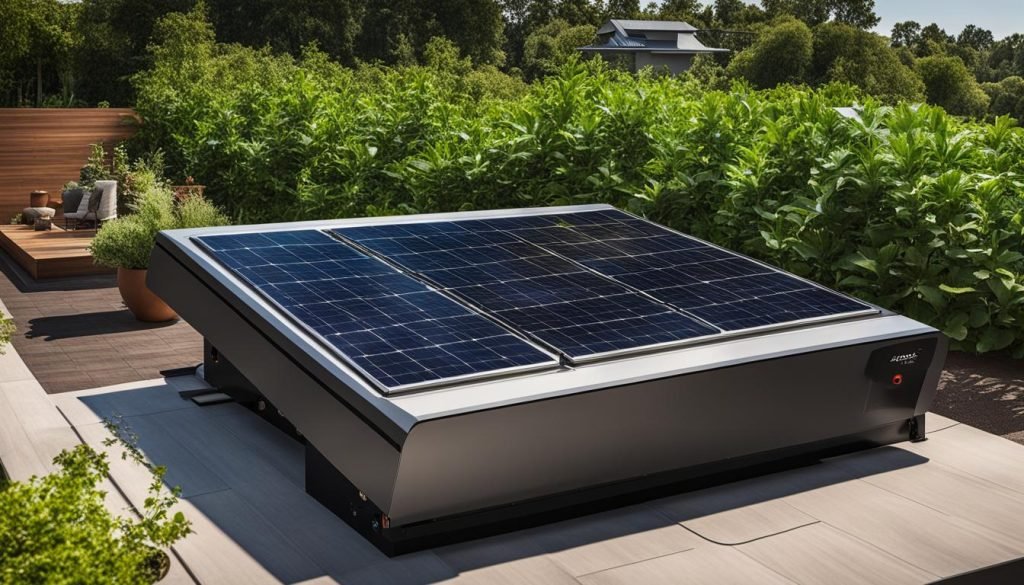
Investing in solar inverters can bring significant financial benefits, including energy cost savings and increased property value. Conducting a cost-benefit analysis will help you assess the upfront costs and long-term advantages associated with solar inverters, ensuring an informed investment decision.
Future-Proofing Your Home with Advanced Inverter Technology
As advancements in renewable energy continue to reshape the way we power our homes, it is essential to future-proof our living spaces with advanced inverter technology. By embracing smart features and connectivity, homeowners can enhance control and monitoring, while scalability enables us to cater to evolving energy needs and technologies.
Embracing Smart Features and Connectivity for Enhanced Control
Advanced inverter technology brings with it a host of smart features that revolutionize the way we interact with our energy systems. From real-time monitoring to intelligent energy management, these smart features provide us with valuable insights into our energy consumption and production. With connectivity options, homeowners can conveniently access and control their solar inverters through mobile apps or web-based platforms. This enhanced control allows for seamless integration with smart home systems and the ability to optimize energy usage based on individual preferences and needs.
Catering to Evolving Energy Needs with Scalable Solutions
Scalability is a crucial aspect of future-proofing our homes. With changing energy needs and the emergence of new technologies, it is vital to have solar inverter solutions that can adapt and grow alongside these developments. Advanced inverter technology offers scalability by allowing the addition of more solar panels or batteries to an existing system without significant modifications. This flexibility ensures that homeowners can expand their renewable energy capacity as required, keeping up with their increasing energy demands and staying ahead of the curve.
| Benefits of Future-Proofing with Advanced Inverter Technology | |
|---|---|
| 1. Enhanced control and monitoring | Improved visibility and optimization of energy consumption |
| 2. Integration with smart home systems | Seamless connectivity and automation for efficient energy management |
| 3. Adaptability to evolving energy needs | Scalable solutions that can accommodate future expansions |
| 4. Maximizing return on investment | Long-term savings through optimized energy production and usage |
By future-proofing our homes with advanced inverter technology, we can pave the way for a sustainable and energy-efficient future. With smart features and connectivity, we gain greater control over our energy systems, while scalability ensures that we can adapt to ever-changing energy needs. Embrace the power of advanced solar inverters and take a proactive step towards a greener tomorrow.
Conclusion
In conclusion, solar inverters play a vital role in enabling green energy homes. Throughout this article, we have discussed the significance of solar inverters in converting the direct current (DC) generated by solar panels into alternating current (AC) for household use. It is crucial to select, install, and maintain the right solar inverter to ensure optimal performance and energy efficiency.
By harnessing clean solar energy, homeowners can reduce their reliance on the grid and contribute to a sustainable future. The use of solar inverters allows for the practical and reliable utilization of solar power in residential settings, making it a viable option for green energy homes.
We have explored the different types of solar inverters available for residential use, including string inverters, central inverters, microinverters, and hybrid inverters. Each type has its own features and benefits, and homeowners should choose the one that best suits their specific needs.
As we move towards a future powered by renewable energy, it is important to embrace solar inverter technology and make informed choices. By selecting the proper solar inverter, homeowners can not only optimize energy production but also contribute to a greener and more sustainable environment.

